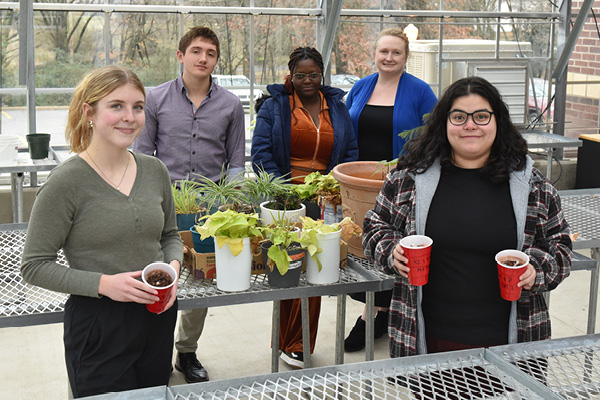
A group of University of the Ozarks biology students were recognized recently in a NASA-supported national competition for their research project to help grow food on Mars.
The team, Ozarks on Mars, received a best in show award for fall 2023 in the undergraduate/professional plant growth division of the Plant The Moon and Plant Mars Challenge, which is sponsored by the Institute of Competition Sciences (ICS) and NASA.
Ozarks on Mars was made up of seven students in the fall semester’s biology capstone class — Roberca Chery, Patrice Dames, April Gomez, Dylan Herring, Jessie Berth, Alexandra Kasper, and Benjamin Stormes — as well as their coach, Dr. Christine Sampson, assistant professor of biology. Their project was titled, “The Effects of Azotobacter and Mycorrhizal Fungi on Red Globe Radishes.”
According to the event’s website, “returning humans to the Moon and planning to go to Mars is challenging in many ways. One of those challenges is how to feed your crew. Using local resources on the Moon could greatly enhance our capabilities to explore our celestial neighborhood. This begs us to ask the question, can you plant the Moon? Can we plant Mars? Can you grow crops in lunar regolith, a fine grained dusty covering of rocks and minerals spread across the surface of the moon? Can we grow food sustainably on the surface of Mars? What nutrients, fertilizers, or other modifications to the regolith are needed to grow nutrient rich, sustainable food sources for future astronauts? Understanding how we can use lunar soil to grow crops is one of the next great steps in supporting our return to the Moon! Through the Plant the Moon and Plant Mars Challenge, you can help NASA scientists and the academic community at large learn the best crop conditions to make this happen.”
Sampson said the students “did an amazing job working to bring their individual strengths together to implement a successful project.”
“This is exactly the type of research being conducted in university and government labs trying to address the challenge of sustaining life in space,” Sampson said. “The judges were very impressed with their work, and suggested the students should pursue publishing their results.”
Sampson said she and Dr. Derek Warren, assistant professor of biology, chose the overall project, but that the specific experiment was driven by the students’ interests.
The Ozarks team decided to study the Scarlet Globe Radish because of its “fast growth period, high soil and drought tolerability and health benefits.” The team focused on the additives azotobacter, a nitrogen fixer used commonly as a biofertilizer, and mycorrhizal fungi, a symbiotic fungus with the purpose of improving water and nutrient intake.
“The students worked in groups to build the project, from deciding what type of plants would be grown, to the experimental design, to the additives that we would be testing,” Sampson said. “For example, a couple of students were really interested in azotobacter and mycorrhizal fungi, and understanding how those could improve crop growth in Martian soil, so they took the lead on growing and adding that to our growth media. Other students focused on monitoring crop growth, and data management.”
This is the first year that Ozarks has participated in the challenge, Sampson said.
“Derek and I saw another university presenting their work from this competition at the Tri Beta conference last year in Dallas and thought it would be a great project for our biology capstone students,” Sampson said. “This is actually only the first phase: the plan is that I will work with the students the first semester to grow crops under different conditions, and then the students in his capstone course during the spring semester will look at the nutritional content of the plants we grow.”
The Ozarks on Mars team submitted its research in early December and found out that they had received the best in show award on Jan. 12.
“Overall, this type of project demonstrates how interdisciplinary the field of science is, which is something we strive to prepare them for here at Ozarks,” Sampson said. “The students exceled at researching some of the latest ideas and methodologies and putting them to work in their study design.”
More information about the Plant the Moon and Plant Mars Challenge can be found at https://plantthemoon.com/best-in-show-fall23/
Topics: Biology
